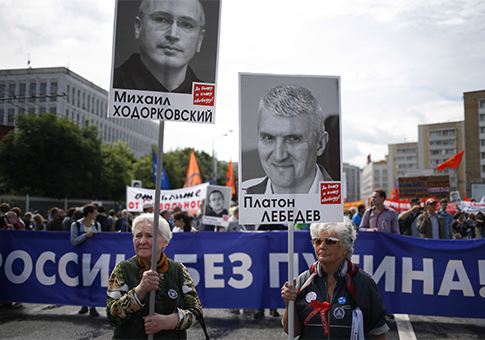A leader of the Russian democratic opposition movement called on the United States Tuesday to apply more pressure on Russian President Vladimir Putin for his government’s repeated human rights abuses as world leaders prepare to convene at the G8 summit in Northern Ireland next week.
Boris Nemstov, co-chairman of the Republican Party of Russia-People’s Freedom Party and a member of the Coordinating Council of the Russian Opposition, said other nations should first acknowledge that Russia does not belong among the world’s most powerful industrial democracies as it imprisons dissidents.
"We must rename the G8 to the G7 plus Putin," he said at a forum hosted by the Foreign Policy Initiative and the Institute of Modern Russia. "This is not a democracy. This is a typical corrupt, authoritarian regime."
The meetings between Putin and President Barack Obama at the summit will likely focus on the Syrian civil war and the potential for a peace conference, Nemstov said, as the United States weighs whether to arm the rebels opposing Syrian President Bashar al-Assad.
However, talk of a conference will only embolden Putin and enable him to quickly change the subject from his treatment of political prisoners, he said.
"Putin believes that Obama is weak, that he’s afraid of him," he said.
Human rights advocates have raised concerns about the Kremlin’s crackdown on political dissent since oil tycoon and vocal Putin critic Mikhail Khodorkovsky was sentenced to 13 years in jail. Khodorkovsky has spent much of the last decade in Siberian labor camps and is set to be released next year, but Putin will likely attempt to extend his sentence, Nemstov said.
Three members of the Russian punk band Pussy Riot were sentenced to two years in prison last year after the band broke into Moscow’s main cathedral and performed an expletive-filled song blasting Putin.
Politics also played a role in the recent prosecution of prominent anti-corruption blogger and activist Alexei Navalny, according to comments by the spokesman for Russia’s powerful investigative committee.
Nemstov became a key figure in the December 2011 protests sparked by allegations of rampant voter fraud benefiting Putin’s United Russia party in parliamentary elections. He shrugged off suggestions that he might be Putin’s next target.
"I believe everything is OK, but everywhere in the world they try to control our steps," he said.
While some of the younger members of the movement push for a revolution, Nemstov said he advocates for peaceful protests and publishing information about the corruption of Putin and his associates. He said he was briefly in jail once for 15 days and that police have twice raided his apartment and office.
The United States could best aid the democratic opposition in Russia by more aggressively implementing the Magnitsky Act, named after former prisoner Sergei Magnitsky, Nemstov said.
Magnitsky was imprisoned after discovering millions in fraud allegedly committed by Russian officials and died there in 2009.
The act denies visas to, and freezes the U.S. assets of, Russians officials associated with the persecution of political dissidents. Eighteen people are currently subject to the act, while there is also a classified list of other persons do not yet qualify.
Nemstov said U.S. leaders should not hold back in sanctioning the officials for fear of damaging relations with Russia.
"Everything depends on your character, on your political will," he said.
Nemstov served as deputy prime minister of Russia in 1997 to 1998 and was twice elected to parliament. Protesting for freedom in his native country is not something he takes lightly, he said.
"If you’re afraid, you must choose some other country," he said.
